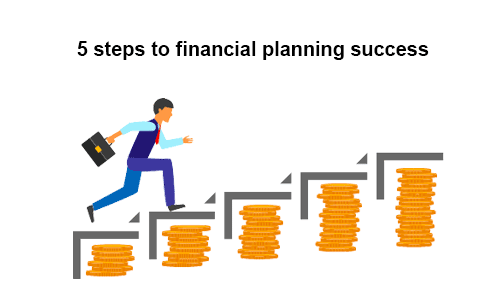Mapping Your Wealth Journey - The Power of Early Financial Planning
Financial planning, much like maintaining a balanced diet or a regular workout regimen, often finds its importance understated due to a lack of clear understanding of its relevance or the process involved.
Such planning certainly holds the promise of a better and more secure life. Initiating the process, however, can appear daunting, especially given the hectic pace of our daily lives. Moreover, when the benefits remain elusive, it becomes even more challenging to muster the enthusiasm to embark on this journey.
If one has been managing without a financial plan so far, the question often arises – why and when to start?
Table of Content
Well, financial planning, in essence, is the methodical approach to managing your finances to achieve personal economic satisfaction. While you may have been doing pretty good so far without it, it’s always advisable to do financial planning so that you get to optimise your savings, investments, expenses, and others as per your short-term and long-term goals.
Let’s unravel the intricate aspects of financial planning, how to go about it, and why it is prudent to commence this journey sooner rather than later.
What is Financial Planning?
Financial planning refers to the process of reviewing your financial status, establishing immediate and long-term financial objectives, and then devising a strategy to fulfil those objectives.
Short-term financial objectives generally encompass tasks such as mitigating debt or getting a contingency fund. Long-term goals, meanwhile, typically focus on acquiring a home, funding children's education, or securing finances for retirement.
Your financial blueprint should also detail the instruments, tools, and methods that you will employ to accumulate and safeguard the wealth necessary to attain your objectives. This could involve deciding on the most suitable savings, investment, and retirement accounts for your savings objectives, or the most effective debt consolidation method.
Types of Financial Planning
Financial planning is a strategic process that helps you fulfil your future aspirations — investment, retirement, education, and more.
Based on these objectives, we can categorise financial planning into various types -
- Investment Planning: This involves creating strategies for future investments, deciding on the type of investments, and how much you should allocate to each instrument, be it mutual funds, NPS, ETFs, or others.
- Retirement Planning: This part focuses on preparing a plan to accumulate a substantial amount of wealth by the time you retire, ensuring a comfortable lifestyle for 20-30 years post-retirement. It guides you in determining how much you need to retire and the amount that you should invest regularly to meet this goal.
- Budgeting: It refers to the scrutiny of your income and expenditures to facilitate a financial plan aimed at reducing costs and debts while boosting your disposable income.
- Insurance Planning: This helps identify the specific insurance products that you should get and the coverage amount that they should provide. This could include life insurance, term insurance, and more, offering financial support during emergencies.
- Education Funding Planning: With the escalating costs of higher education, planning for such expenses well in advance has become paramount. This type of planning ensures that you don't compromise on your educational goals.
- Estate Planning: Estate planning offers a roadmap for a smooth transition of one’s assets to their loved ones after their demise, avoiding potential family disputes. Creating a will is a vital aspect of estate planning and outlining the distribution of assets.
Key Steps of Financial Planning
Here’s how you can kickstart your financial planning journey –
Step -1
The first step in financial planning is to outline your financial objectives. Make sure that they are SMART - Specific, Measurable, Achievable, Relevant, and Time-bound.
Penning down SMART goals aids in prioritising critical objectives and instils a realistic approach towards achieving them.
For instance, if you're 35 and aim to get AED 5 million by age 60, you've got 25 years to achieve this. You then need to figure out your monthly investment and the returns required.
Here's an illustrative table -
| Required Rate of Return | Monthly Investment Amount Required |
|---|---|
| 7% | AED 5,250 |
| 10% | AED 3,750 |
| 12% | AED 2,650 |
Step -2
To secure your financial goals, you need to maximise your investments. This is possible by curtailing discretionary spending and channelling the savings towards investments.
Step -3
This step involves identifying the right avenues for investment. For instance, equities could be a suitable choice for long-term goals, while fixed deposits or Debt Funds might be apt for short-term goals.
Your investment strategy should encompass a diverse range of assets such as UAE-based and international equities, debt, gold, and others as per your risk tolerance. This involves evaluating your comfort with potential declines in your portfolio and your overall risk profile, which is influenced by factors like age, income, lifestyle, liabilities, responsibilities, and your reaction to adverse events.
Step -4
Financial planning is an ongoing process, not a one-off task. After devising an investment strategy for yourself, regular monitoring of your progress towards various goals is essential. This involves the periodic removal of underperforming investments and the inclusion of promising investment opportunities.
Why Should I Start Financial Planning Early?
Understanding the significance of financial planning at an early stage of life can have a profound impact on your future financial health. The decisions that you make today, whether it's saving a portion of your income, investing in the right assets, or spending wisely, directly influence your ability to achieve financial stability and fulfil your life's goals.
Here are 5 compelling reasons why initiating financial planning early can make a world of difference -
- Enjoy the Power of Compounding: Starting financial planning early allows your money to grow over time through the power of compounding. This is when the returns on your investments earn their own returns, essentially making your money work harder for you. The longer your money is invested, the more time it has to grow.
- Afford to Take More Risks: When you start early, you have a longer investment horizon which allows you to take on more risk. High-risk investments like equities often have the potential for higher returns in the long run.
- Accumulate a Bigger Retirement Corpus: Early financial planning means you can save and invest more towards your retirement corpus. This ensures that you have a substantial amount saved by the time you retire.
- Achieve Financial Goals More Comfortably: Whether it's buying a house, starting a business, or funding your children's education, these significant financial goals can be achieved more comfortably when you start planning early. It gives you the luxury of time to build up the necessary funds.
- Develop a Habit of Saving and Investing: When you begin financial planning early, you cultivate a habit of regular saving and investing. This not only instils financial discipline but also helps in managing your finances efficiently.
Wrapping Up: The Essence of Timely Financial Planning
Financial planning is a crucial step towards financial stability and wealth creation. It offers a systematic approach to managing your finances to realise your personal financial aspirations.
Like any journey, starting early provides you with a significant advantage. It affords you the luxury of time, which allows the power of compounding to increase your wealth, encourages a regular saving habit, and helps you reach your financial milestones with relative ease.
Remember, while the initial steps may seem overwhelming, the rewards of early financial planning are incredibly satisfying. Make it an integral part of your life today, and enjoy a secure, financially independent tomorrow!
More From Investment
- Recents Articles
- Popular Articles













